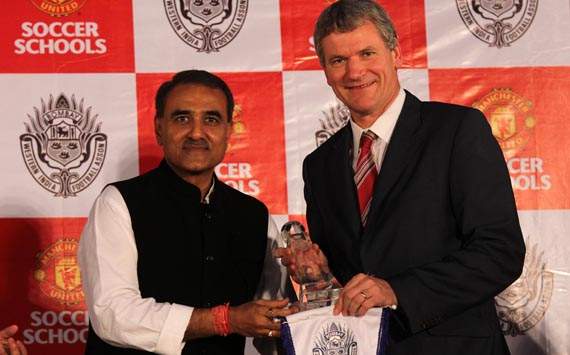The Old Trafford chief reacts as Uefa hint their plans to level Europe's monetary playing field are unlikely to be able to include a transfer embargo on transgressing clubs
Nov 26, 2011 11:20:00 AM

WIFA
EXCLUSIVE
By Rahul Bali
Manchester United chief executive David Gill has admitted that Uefa's Financial Fair Play (FFP) regulations will need appropriate sanctions to work as intended, but has backed European football's governing body to implement a robust system in time.
Uefa decided last Wednesday to shelve their plans of enforcing a transfer ban on clubs who do not meet the new regulations, as such a punishment would not be legally enforceable. This is primarily due to the fact that player registration lies with Fifa rather than the European board.
Now Uefa, under the guidance of president Michel Platini, must reconsider how they will punish clubs who do not comply with FFP, but Gill is optimistic a solution will be found.
“I don’t think an official report has come by Uefa," Gill told Goal.com. "I think Uefa, as I understand it, are currently looking at the sanctions they are going to impose in conjunction with the Financial Fair Play and I think they will be decided and communicated in the first part of 2012.
“But everyone recognises that if Financial Fair Play is to achieve its goals, then it is going to have appropriate sanctions whatever they may be. So that’ll be worked out by Uefa with the clubs and let’s see what happens."
United's rivals Manchester City announced losses of £195 million (€227m) for the 2010-11 financial year last week, and FFP regulations state that the clubs can lose no more than£39.5m (€46m) over the next three years, including the present one. The idea is to level the playing field for the 660 top-division clubs scattered across 53 European countries.
Gill is confident that United's structure stands them in good stead to meet the demands of FFP and also still compete to sign the best players in the world.
“Manchester United, ever since we floated back in 1991, we have had a policy whereby we will not spend more than 50 per cent of our revenues in total wages," said Gill. "And if we do that, we still believe the size of our revenue has enabled us to attract, retain and pay appropriate wages to some of the best players in the world.
"That's our model and still leaves us money to invest back in the business - in the training ground or in the redevelopment of the ground or in the transfers.
“Now other clubs have to determine their own model. What Financial Fair Play will do is have a requirement that clubs have to break even. So, by definition, that should have some control over the player wages, the transfer fees and the amortisation of transfer fees.
“So I think what Michel Platini is doing with Financial Fair Play is the next step in trying to bring some financial discipline.”
How do you stay up to date with football when on the move? With http://m.goal.com – your best source for mobile coverage of the beautiful game.
source : Goal.com






0 comments:
Post a Comment